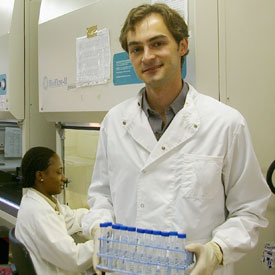Serving individuals while developing lab skills
March / April 2012 | Volume 11, Issue 2
By Steve Goldstein

Photo courtesy of Ryan Davis
Fulbright-Fogarty fellow Ryan Davis finds the
social justice aspect of global health appealing
and his posting in Botswana helped him clarify
his career options.
Coming of age in the midst of the HIV epidemic and during the increasing globalization of health care had a profound influence on Fulbright-Fogarty fellow Ryan Davis and helped determine the direction of his career.
At Georgetown University, Davis majored in English literature and minored in chemistry in his pre-med studies. He enjoyed the narrative aspect of medicine and it informed his creative writing. When he volunteered at the Whitman-Walker Clinic in Washington, D.C., he listened to the way AIDS patients talked about how a diagnosis had irrevocably altered their lives. "My immediate compassion for patients with HIV grew into a broader commitment to a medical career," he said. The reach of the disease inspired him to choose a medical school based upon its global health program, so Davis attended the Columbia University-affiliated Medical School for International Health in Beer Sheva, Israel.
The service aspect of medicine was also important to Davis. His father, a dentist and lay minister, and his mother, a public school administrator, instilled in him the notion of helping others in need. "It seemed like medicine was a chance to have a service-oriented career that included my science interests, but which also involved interpersonal connections," Davis explained.
The fellowship, it seemed to Davis, answered the logistical and ethical challenges presented by short-term research projects conducted in low-income settings typically undertaken by students interested in global health. The Fulbright-Fogarty experience "promised a more sustained, 10-month time period to devote to a study with potentially meaningful results at a site with established partnerships between local and U.S. researchers," he said. Davis chose to apply for the Botswana-Harvard AIDS Institute for the opportunity to work at a well-equipped lab with highly-regarded mentors and a large body of published literature.
Davis is developing a technique to detect acute HIV infection (AHI) using dried blood samples as part of a prevention study. Because secondary HIV transmission is acute and recent HIV infection may contribute significantly to the epidemic in Botswana, "the potential for a test-and-treat prevention strategy would be facilitated by screening methods to detect AHI," he said. Once he finalizes optimization of the pooling technique, he said, it will be applied to all seronegative samples in the study to quantify HIV prevalence, target antiretroviral therapy and analyze cost effectiveness of the pooling strategy as compared to individual testing.
Davis said his aspirations for the fellowship have already been achieved, as the experience has provided "a valuable opportunity" to assess what is gained through international partnerships and how it is achieved. A more rounded image of his long-term goals has come into focus and he’s gained more experience with laboratory technique, he said, in addition to having applied his biostatistics training. Not least, he noted, are the new friendships, experiences and coping mechanisms that Davis has acquired.
The fellowship has also given him a deeper appreciation of his parents' lesson about giving back. "There's intrinsically a social justice mindset in public health. Some think of it as a service job and there's something really beautiful and important about that," he said. "But even as you serve the greater good, you cannot lose track of the ways that disease affects the individual. That brings me back to those formative experiences I had at Whitman-Walker, which remain important to me."
More Information
To view Adobe PDF files,
download current, free accessible plug-ins from Adobe's website.